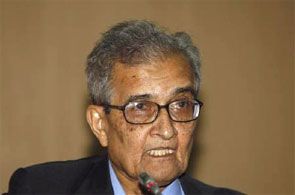 Nobel laureate Amartya Sen on Monday sought to blame the opposition for disruption in Parliament, saying they were "bursting debates" and "killing arguments" in the House as he backed the Food Security Bill in its present form.
Nobel laureate Amartya Sen on Monday sought to blame the opposition for disruption in Parliament, saying they were "bursting debates" and "killing arguments" in the House as he backed the Food Security Bill in its present form.
Sen, an eminent economist, said the essence of democracy is to have arguments and there is a need for skillful presentations of what the issues are. At a press conference along with activists on the Food Security Bill, he said, "There are things on which opposition may have different views. They should debate the issue...rather than disrupting proceedings. In Parliament they are killing arguments. If the Opposition succeeds in bursting Parliamentary debate, they should be held responsible it."
Sen said he is "shocked at media being not able to play up the issue of non-discussion in Parliament". Favouring the passage of the food bill, he said it would lead to a substantial enhancement of entitlements of the poor through the PDS.
The Food Bill aims to give legal right over a uniform quantity of 5 kg food grains at a fixed price of Rs 1-3 per kg via ration shops to 67 per cent of the population.
Last week, the amendments to the Food Bill, which was originally introduced in Parliament in December, 2011, was moved in the Lok Sabha but discussion could not take place due to disruption of proceedings on several issues, including the 'coalgate scam'.
Amid uproar over several scams, government on Monday sprang a surprise over the Opposition in the Lok Sabha by taking up the ambitious National Food Security Bill for consideration despite protests.
A brief debate was held amid an unprecedented din with members from Left and Right in the Well denouncing "dictatorial ways" of the government in pushing through the much talked about legislation when Parliament is paralysed over various scams.
When pointed out that the government is planning to bring an ordinance, Sen said it would not be a happy situation. The question to be asked then would be why did the government have to go the ordinance way and who was responsible for Parliament not functioning, he said.









